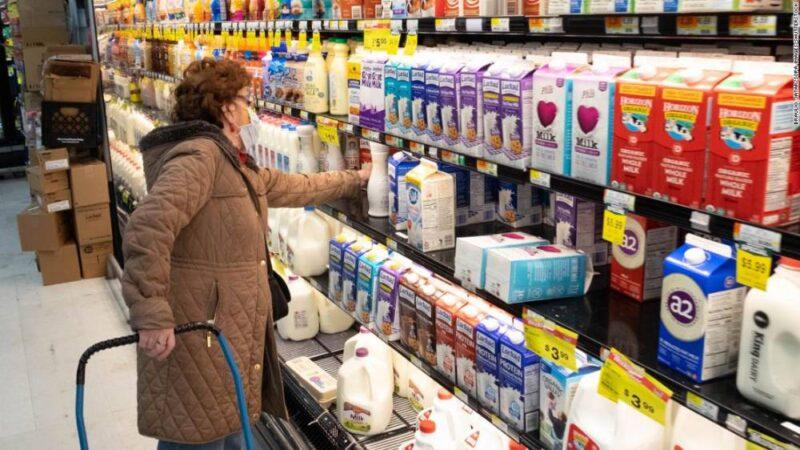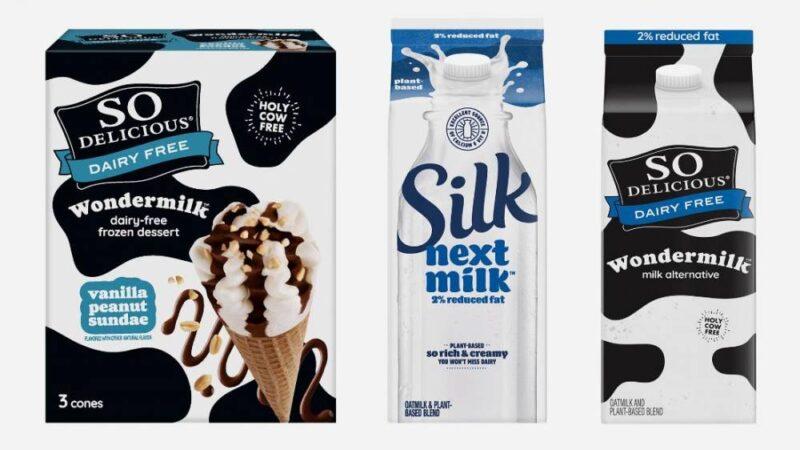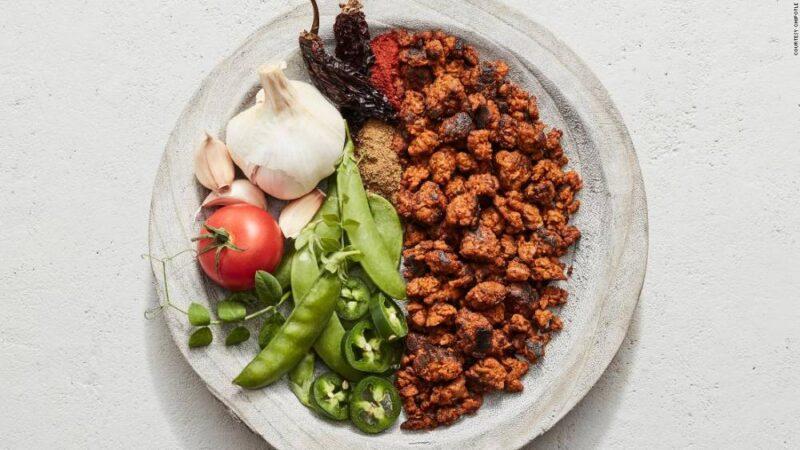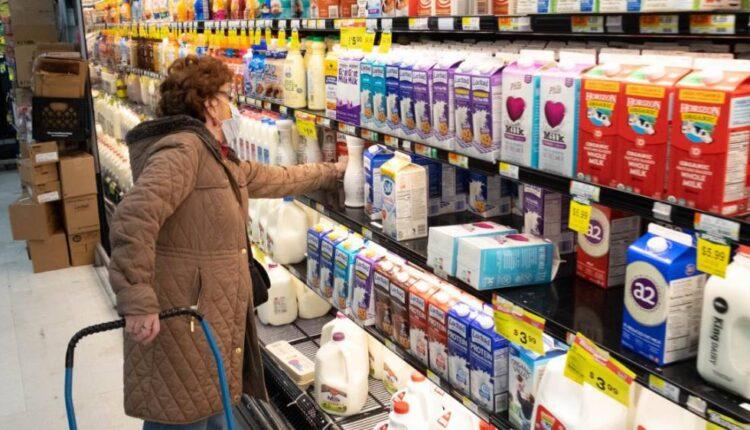New York (CNN Business)Given the dizzying array of options in the dairy aisle of the grocery store these days, some may think that the last thing we need is another type of milk. Yogurt maker Danone disagrees.
Executives at the company, which owns plant-based dairy brands Silk and So Delicious, as well as cow’s milk brand Horizon Organic, think that the dairy aisle is missing something important: A plant-based milk alternative that tastes like, well, milk.To fill that gap, Danone is launching two new dairy-like milk alternatives in North America: Silk Nextmilk and So Delicious Wondermilk, both blends made with oat milk, coconut milk, coconut oil and soy protein, among other ingredients. The products each come in full fat and 2% and will hit US grocery shelves in January with a suggested price of $4.99 per carton. Nextmilk will be available at regular grocery stores, and Wondermilk at natural grocers. Wondermilk will also be used in a new line of dairy-like ice creams that will be available through the So Delicious brand.
One challenge for the company is that milk, and imitations thereof, is already a pretty crowded category.

The dairy shell is crowded, but leaders at Danone believe there’s room for more. Dairy milk comes in organic or regular whole, skim, 2%, plus fortified options and lactose-free alternatives. Non-dairy milk comes in almond, soy, and, of course, oat. At the fringes are coconut, cashew, rice and even potato. Many of these come in a variety of flavors and have sweetened or unsweetened options. Read MoreAnd though it’s a nascent category, there are already milk alternatives on the market that aim to taste more like the real thing. Chilean startup NotCo is behind a product called Not Milk, which is made with water, sunflower oil, pea protein and a bit of pineapple juice, among other things. Nestle launched a pea-based drink called Wunda in Europe this year. And Impossible Foods has said that it is working on “Impossible milk” which, like its burgers, is supposed to look and taste like the real thing. Other options could follow. A company called Perfect Day, for instance, uses fermentation to create a milk protein that is free of ingredients produced by animals. That protein is used in ice cream today, and could be included in more dairy products moving forward. But Danone (DANOY) hopes the pair of alternative milks it is launching will attract a specific type of consumer: Someone who wants to move away from dairy milk and add plant-based beverages to their diet, but really likes how cow’s milk tastes. The company is betting that there’s a large, untapped market of people who are holding off on buying non-dairy milk until the right option comes along — and that Nextmilk or Wondermilk will fit the bill. Essentially, Danone wants to do for plant-based milk what Impossible Foods and Beyond Meat (BYND) did for plant-based burgers. The question is whether consumers who flocked to plant-based proteins will do the same for plant-based milk.
How Danone made Nextmilk and Wondermilk

Danone is launching new dairy-like milk alternatives in the United States next year. It took a couple of years for Danone’s team of experts to come up with the new beverages, said Takoua Debeche, chief research and innovation officer for Danone North America. “We tried to mimic both the positive and the negative attributes of dairy flavors,” Debeche said. Cow’s milk is sweet and creamy, she said. But it’s also sour, bitter and salty. Danone tried to match those flavors, as well as the texture of milk, using blends of plant-based liquids. Ultimately, Debeche and her team landed on the blend made with oat, coconut and soy in each type of alternative milk. While both products rely on most of the same ingredients, they’re not totally identical, Debeche explained. Silk’s nextmik is designed to be consumed on its own (or maybe with a warm cookie). You can do that with Wondermilk as well, but that version was designed with cooking or baking in mind. To this reporter, they each seemed like a passable substitute for milk. The whole fat version of Nextmilk is smooth and rich and tastes a little sweet and a little sour, as Debeche promised. It’s still identifiable as an alternative — the color and texture are a little off, and there’s a nuttier base — but is a closer approximation than soy, almond or oat. Whole fat Wondermilk looks a little whiter and chalkier and has a milder flavor, but is still pretty close to the mark.
A holy grail
Sales of milk alternatives may be growing, but the $2.5 billion category still trails far behind the $11.2 billion US dairy milk market. The category also lags in terms of household penetration, or the percentage of consumers who purchase a product. For cow’s milk, penetration is about 94%, Danone said, citing IRI data. For plant-based milk, that figure is roughly 40%. “We think there’s a huge opportunity to close the gap between those households that currently have dairy milk in the refrigerator and those that currently have plant based beverages in their refrigerator,” John Starkey, president of plant-based food and beverages for Danone North America, told CNN Business. Making a product that looks and tastes like milk is essential to achieving that goal, he said. Customers who buy dairy milk may be doing so because they “have comfort and a lot of assurances from the nostalgia of dairy,” he said. By developing products that mimic the look, taste and texture of milk, Danone believes it has broken “one of those holy grail barriers that’s keeping consumers away from plant-based beverages.” The company hopes customers will love the product — but won’t abandon the plant-based or regular milks they bought from Danone before. “Every person in the household doesn’t necessarily have the same tastes, needs and desires,” Starkey said. “So we want to really make sure … that we have a portfolio of offerings that can meet all of consumers’ desires and tastes.”

Chipotle is testing plant-based chorizoMany American adults are indeed buying several types of milk, said Sydney Olson, food and drink analyst at Mintel. About 17% of US adults buy at least four types of milk, and 39% buy two to three, according to a Mintel, which surveyed 2,000 internet-using adults in June about their milk purchasing habits over the previous three months. For Danone, that could mean that Nextmilk or Wondermilk could get swept into the fold: A shopper might add it to the mix, while still buying other types of milk for different applications — coffee, cereal, smoothies — or to accommodate different tastes. But it could also mean that shoppers will consolidate, swapping multiple cartons out for one new carton. A dairy-like product could “help US adults … save money and time in not purchasing four different types of milk,” Olson said.
But Danone will have to tout its health benefits in a way that makes sense to consumers, something that could be trickier for a plant-based dairy brand than one that makes plant-based hamburgers. “With meat it’s very clear… you will have a hamburger whenever you are treating yourself,” said Maria Mascaraque, who oversees food and nutrition research at Euromonitor. “I don’t think cow’s milk or dairy in general has as bad a reputation as processed meats.”
Source: edition.cnn.com

